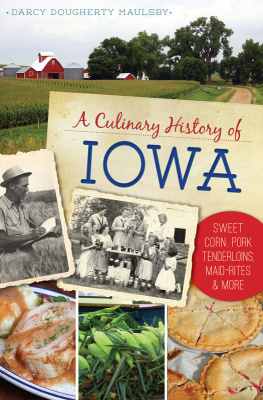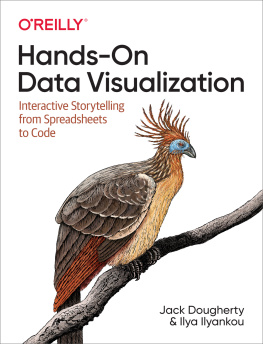Published by American Palate
A Division of The History Press
Charleston, SC
www.historypress.com
Copyright 2020 by Darcy Dougherty Maulsby
All rights reserved
Cover images: Barn quilts, such as this one near Lake View, have become a common sight in parts of rural Iowa, where they help promote rural tourism and boost economic development. Authors collection; roadblocks like this one, organized near Sioux City in 1932 by the Farmers Holiday Association, protested low prices paid for farmers products during the desperate days of the Great Depression. State Historical Society of Iowa, Des Moines; in 2018, Ames-based Smart Ag made Farm Progress Show history with its autonomous tractor demonstration near Boone. The system runs on AutoCart, a software application that fully automates a grain cart tractor and can provide farmers with much-needed labor assistance during harvest. Smart Ag.
First published 2020
E-book edition 2020
ISBN 978.1.43966.973.0
Library of Congress Control Number: 2019956019
print edition ISBN 978.1.46714.249.6
Notice: The information in this book is true and complete to the best of our knowledge. It is offered without guarantee on the part of the author or The History Press. The author and The History Press disclaim all liability in connection with the use of this book.
All rights reserved. No part of this book may be reproduced or transmitted in any form whatsoever without prior written permission from the publisher except in the case of brief quotations embodied in critical articles and reviews.
FOREWORD
As a lifelong farmer who also has worked for six decades representing Iowans in state and federal government, I wear my rural roots as a badge of honor and believe its important for farmers to have a seat at the policymaking tables. Farmers take the long view of things. Maybe thats why they dont forget important lessons from history.
Only 2 percent of the American population shoulders the responsibility for growing enough food to feed the U.S. population. Our agrarian-based heritage has experienced rapid transformation in the last generation. Fewer Americans, even in Iowa, have a direct link to living or working on a farm. Not enough people appreciate that food security is directly tied to national security. Food security extends beyond national sovereignty. American agricultureand the farmers, workers and businesses along the supply chainanchors the U.S. economy and increasingly strengthens U.S. energy independence, as well.
From a historical perspective, there are two rules of thumb I use to explain how important food security is to maintain peace and prosperity in society. Napoleon Bonaparte, emperor of France in the early nineteenth century, reportedly said, To be effective, an army relies on good and plentiful food. In other words, an army marches on its stomach. Food security ensures that a nation can feed its military, whose men and women in uniform are deployed to protect and defend a nations sovereignty, at home and abroad. I also like to remind policymakers that any society is only nine meals away from a revolution.
Charles Grassley, farmer and U.S. Senator from Iowa. Courtesy CharlesGrassley.
Political leaders who embrace the misguided notion that socialism is the answer to peace and prosperity are either grossly misinformed or willfully ignorant about the peril of leaders who promise to fix inequality with government control. History teaches us that when government suppresses freedom and liberty, the peoples path toward peace and prosperity is replaced with food and medicine shortages, hyperinflation, power outages and even more economic and social inequality. Regimes inspired by utopian socialist principles do not eradicate hunger or poverty; they extinguish peace and prosperity at the expense of individual freedom and liberty.
Despite the regional, ideological and partisan differences that divide Americans, we share a common humanity and fundamental thread of human existence. We all need to eat to survive. Technology and innovation continue to revolutionize farming and food production.
When I started farming in the 1950s, the average corn yield in Iowa was about 45 bushels per acre. Today, Iowa farmers yield an average of 202 bushels per acre. This productivity helps feed and fuel a growing world population with affordable, wholesome food and renewable energy. At the same time, farmers are able to conserve resources and save money using no-till, cover crops and precision agriculture.
With a global population expected to reach nearly 10 billion people by 2050, the importance of agriculture research and education is vital for human civilization. Iowas deeply rooted agrarian heritage continues to lead the way with excellent opportunities to foster ag literacy; food, plant and animal science; and entrepreneurship.
Iowa boasts a vibrant network of FFA organizations across the state. Whats more, Iowas native son Norman Borlaug paved an agricultural revolution credited with saving 1 billion people from starvation. The Father of the Green Revolution was awarded the Nobel Prize in 1970, and Iowa celebrates his legacy with a statue in the Rotunda of the U.S. Capitol.
Iowa is also home to the World Food Prize. For three decades, it has brought thousands of people from around the world to Des Moines in October to talk about food security in a symposium known as the Borlaug Dialogue.
Im proud to be among the generations of Iowa farmers who have answered the call to put food on family tables. My son Robin Grassley, a third-generation farmer, and I continue farming 750 acres together.
Checking the rearview mirror to look back at history helps ensure that the road ahead paves the way for prosperity and opportunity for family farmers and all those who earn their livelihoods and enjoy their way of life in rural America. With only 2 percent of the population growing food for the rest of the nation, its more important than ever to educate consumers about where their food comes from.
Senator Chuck Grassley,
Iowa
ACKNOWLEDGEMENTS
Just when you think youre pretty well versed in Iowas agriculture history, you realize that theres so much more to learn. Undertaking a project as huge as trying to share an overview of Iowas agricultural history is something I certainly couldnt do alone. I dont pretend that this book even comes close to sharing all the remarkable stories that have shaped Iowa agriculture, but its a start.
I appreciate the help I received throughout this journey from various museums, libraries, professional historians, agribusinesses, various farm organizations and ag commodity groups, Iowa State University staff, my friends at the State Historical Society of Iowa and farm families across the state. Im grateful for places that are sharing the story of Iowa agriculture like Living History Farms, the John Deere Tractor & Engine Museum in Waterloo, county museums across Iowa, Heartland Acres Agribition Center in Independence, the Huxley Learning Center, the Heartland Museum in Clarion, the Kossuth County Agriculture & Motorsports Museum in Algona, the Froelich Museum in northeast Iowa and others. Your work matters.















